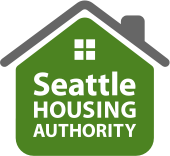Roberta Sherwood hired to support community building efforts
SEATTLE—June 2, 2008—If Roberta Sherwood is successful in meeting her goals at Seattle Housing Authority, resident leaders will be more visible in activities in two years, as community building staff “blends more into the background.”
“When we are successful,” she said, “residents are able to work in their communities in positive ways. They recognize that they have a lot of power in their own community, that they have lots of choices. Community Builders are there to support them in their growth as they develop the skills to be excellent leaders in their communities.”
As Sherwood talks about her new job, it is easy to see that she is enthusiastic about promoting resident leadership. “I believe anyone can be a leader if they have the desire and the necessary sense of responsibility. We can help them with the training and support they need to learn the skills of leadership.
“Some community members come into their community leadership roles with those skills already in place. Others need the opportunity to develop them. We want to accept people where they are and work with them as they learn and develop their own skills.”
Sherwood began in her job as Community Building Coordinator in late April. She brings a varied background to the job, much of it focused on nonprofit and social service work, including the YWCA. In one job, she helped to develop a shelter for abused women and their children. In another, she did community support group work in a mental health center where she helped people learn how to support each other.
Here in Seattle she worked for eight years as the manager of Hilltop House on First Hill, a low-income high rise building that receives rental subsidy from HUD. This experience helped her to gain understanding of the specific concerns of low-income seniors. “I enjoyed working with the resident council there,” she said. “It was very active and involved, doing fundraising for projects around the building and establishing a P-Patch.”
Sherwood believes that when communities are successful in their community building efforts, they are more successful in general, with fewer problems or negative community issues. “Strong communities are better for everyone,” she notes.
